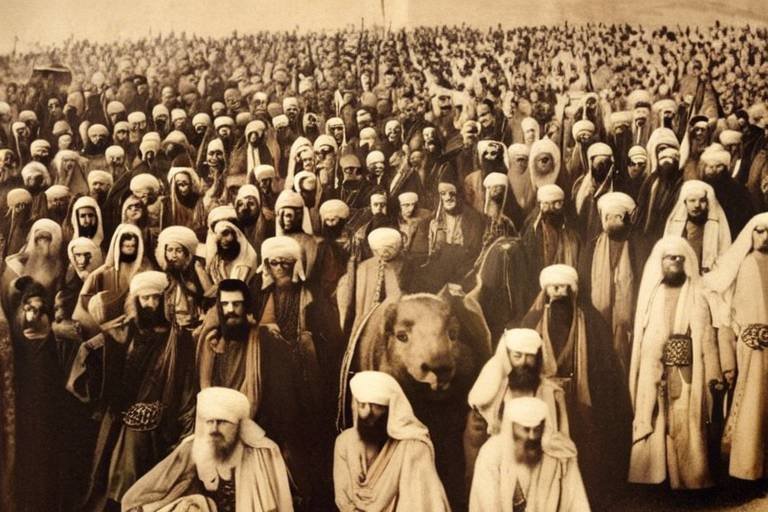The Decline of the Maurya Empire - Factors and Effects
Once a formidable empire that dominated the Indian subcontinent, the Maurya Empire faced a gradual decline that reverberated through the annals of history. Various factors converged to erode the empire's strength and influence, reshaping the political landscape of ancient India. Understanding the reasons behind this decline and the far-reaching effects it had is crucial in unraveling the complexities of this historical narrative.
Internal dissension emerged as a potent force undermining the Maurya Empire's stability. Strife among the ruling elite, power struggles for supremacy, and weakened governance structures all contributed to a gradual loss of central authority. The once-unified empire found itself fragmented and vulnerable, unable to withstand the internal pressures tearing at its foundations.
Economic challenges further exacerbated the empire's woes, plunging it into a quagmire of financial instability. Over-expansion, the strain of continuous military campaigns, and inefficiencies in revenue collection sapped the empire's resources. The economic downturn not only weakened its military might but also eroded the social and economic fabric that held the empire together.
Foreign invasions delivered a fatal blow to the Maurya Empire, shattering its territories and resources. Incursions by powers such as the Greeks and the Sakas disrupted the empire's established order, leading to further disintegration. The once-mighty empire found itself besieged on multiple fronts, struggling to repel external threats while grappling with internal turmoil.
Administrative issues plagued the empire, fostering an environment rife with corruption and inefficiency. Bureaucratic hurdles, coupled with the failure to address regional grievances, weakened the empire's cohesion. The administrative shortcomings sowed seeds of discord, hastening the empire's descent into chaos and disarray.
Social unrest simmered beneath the surface, fueled by heavy taxation, forced labor, and neglect of social welfare. The populace's discontent grew as the burdens imposed by the empire became increasingly unbearable. Rebellion and unrest spread like wildfire, challenging the empire's authority and further destabilizing its already fragile foundations.
Religious and cultural shifts played a pivotal role in the Maurya Empire's decline, altering the fabric of society and eroding its moral authority. Changes in religious patronage, coupled with a decline in imperial support for Buddhism, fractured societal unity. The empire grappled with a crisis of identity, as cultural transformations reshaped the very essence of its existence.
Environmental degradation added another layer of complexity to the empire's woes, as ecological factors took a toll on food production and livelihoods. Deforestation, soil erosion, and agricultural decline weakened the empire's foundations, exacerbating its vulnerabilities. The environmental crisis further strained the empire's resources, pushing it to the brink of collapse.
The legacy of Emperor Ashoka loomed large over the empire's decline, casting a long shadow on its final days. Ashoka's conversion to Buddhism, his efforts at social welfare, and his vision of a just and harmonious society stood in stark contrast to the empire's eventual unraveling. The enduring impact of Ashoka's reign underscored the tragic irony of a once-great empire brought low by its own internal strife.
Reflecting on the lessons learned from the Maurya Empire's decline offers valuable insights into the complexities of ancient Indian history. The empire's influence on subsequent events, its enduring legacies, and the echoes of its downfall reverberate through the corridors of time. The Maurya Empire's decline serves as a cautionary tale, a reminder of the fragility of power and the inexorable march of history.

Internal Dissension
Exploring the reasons behind the decline of the once-mighty Maurya Empire and the consequences it had on the Indian subcontinent during ancient times.
Internal dissension played a pivotal role in the downfall of the Maurya Empire. The ruling elite, consumed by power struggles and internal conflicts, gradually weakened the governance structure. This led to a loss of central authority within the empire, creating a fertile ground for disunity and chaos to take root. As the once-unified empire grappled with internal strife, its ability to effectively govern and maintain control over its vast territories waned.
The fragmentation caused by internal dissension not only eroded the empire's strength but also sowed the seeds of its eventual demise. The lack of cohesion among the ruling class and their incessant power struggles created a vacuum that invited external threats, further exacerbating the empire's vulnerabilities. Without a unified front, the Maurya Empire found itself increasingly susceptible to external pressures and internal rebellions.
Moreover, the weakened governance resulting from internal dissension hindered the empire's ability to address pressing issues and maintain social order. The once-mighty Mauryan Empire, plagued by internal discord, stood on the brink of collapse as its ruling elite failed to reconcile their differences and prioritize the empire's stability and prosperity.
Ultimately, internal dissension served as a harbinger of the Maurya Empire's decline, highlighting the critical importance of unity and effective governance in sustaining an empire's longevity and influence.
- What were the main factors contributing to the decline of the Maurya Empire?
- How did internal dissension impact the governance of the Maurya Empire?
- What role did external invasions play in the downfall of the Maurya Empire?
- How did environmental degradation affect the Maurya Empire's agricultural productivity?
- What was Emperor Ashoka's legacy and its significance in the empire's history?

Economic Challenges
Exploring the reasons behind the decline of the once-mighty Maurya Empire and the consequences it had on the Indian subcontinent during ancient times.
During its peak, the Maurya Empire stood as a beacon of wealth and power in the ancient world. However, beneath the surface of grandeur, the empire faced significant economic challenges that ultimately contributed to its downfall.
One of the primary factors that strained the Mauryan economy was the issue of over-expansion. The empire's ambitious military campaigns to conquer vast territories not only stretched its resources thin but also led to increased financial burdens. Maintaining control over such a vast expanse proved to be a costly endeavor.
Moreover, the inefficient collection of revenue further exacerbated the economic instability within the empire. The failure to effectively gather taxes and resources from the provinces weakened the central treasury, hindering the government's ability to fund essential services and infrastructure.
As the Mauryan Empire struggled to finance its expansive administration and military endeavors, it faced a looming financial crisis. The economic strain from continuous warfare and administrative expenses left the empire vulnerable to internal dissent and external threats.
Additionally, the economic challenges faced by the Mauryan Empire were compounded by the lack of sustainable economic policies. The empire's reliance on conquests and tribute as primary sources of income proved to be unsustainable in the long run, leading to a cycle of financial instability.
In conclusion, the economic challenges that plagued the Mauryan Empire played a significant role in its decline, highlighting the importance of sound economic management and fiscal responsibility in sustaining a vast empire.
1. What were the primary economic challenges faced by the Maurya Empire?
2. How did over-expansion contribute to the economic instability of the empire?
3. What impact did inefficient revenue collection have on the Mauryan economy?
4. Why was the reliance on conquests and tribute unsustainable for the empire's finances?

Foreign Invasions
Exploring the reasons behind the decline of the once-mighty Maurya Empire and the consequences it had on the Indian subcontinent during ancient times.
Foreign invasions played a significant role in the downfall of the Maurya Empire. The incursions by foreign powers such as the Greeks under Alexander the Great and the Sakas from Central Asia posed a serious threat to the stability of the empire. These invasions not only resulted in territorial losses but also disrupted trade routes and resource management.
The Greek invasion led by Alexander the Great in the 4th century BCE marked a turning point in the history of the Maurya Empire. Although Alexander's conquest did not directly impact the core Mauryan territories, it created a power vacuum in the northwest region, paving the way for subsequent invasions and incursions by other foreign powers.
Furthermore, the incursions by the Sakas, a nomadic tribe from Central Asia, further weakened the Mauryan Empire. The Sakas' military prowess and strategic advancements posed a formidable challenge to the Mauryan forces, leading to prolonged conflicts and territorial disputes.
These foreign invasions not only drained the empire's resources but also sowed seeds of discord and fragmentation within the Mauryan territories. The constant threat of external aggression forced the empire to divert its attention and resources towards defense, compromising its ability to govern effectively and maintain internal cohesion.
In conclusion, the foreign invasions faced by the Maurya Empire significantly contributed to its decline by destabilizing its territories, disrupting trade networks, and draining its military and economic resources.
Q: What was the impact of the Greek invasion on the Maurya Empire?
A: The Greek invasion led by Alexander the Great created a power vacuum in the northwest region, paving the way for subsequent invasions and territorial disputes that weakened the Mauryan Empire.
Q: How did the Sakas contribute to the decline of the Maurya Empire?
A: The Sakas, a nomadic tribe from Central Asia, posed a formidable challenge to the Mauryan forces, leading to prolonged conflicts and territorial losses that further weakened the empire.
Q: Why were foreign invasions a significant factor in the decline of the Maurya Empire?
A: Foreign invasions drained the empire's resources, disrupted trade routes, and created internal discord, ultimately contributing to the empire's destabilization and downfall.

Administrative Issues
During the later years of the Maurya Empire, administrative challenges played a significant role in its decline. Corruption seeped into the bureaucratic system, with officials prioritizing personal gain over the welfare of the empire. This led to a breakdown in governance, as decisions were made based on self-interest rather than the greater good. The lack of accountability and transparency further eroded the trust of the people in the administration, causing widespread discontent.
Furthermore, bureaucratic inefficiencies hampered the effective functioning of the empire. The cumbersome administrative processes slowed down decision-making and hindered the implementation of policies. As a result, issues remained unresolved, grievances accumulated, and the empire struggled to adapt to changing circumstances. The failure to address regional disparities and provide adequate governance at the local level exacerbated internal divisions and weakened the overall cohesion of the empire.
Another critical aspect of the administrative issues was the failure to anticipate and respond to emerging challenges. The leadership's shortsightedness and inability to proactively address issues such as economic downturns, social unrest, and external threats left the empire vulnerable and ill-prepared. The lack of strategic planning and foresight in governance contributed to the empire's gradual decline and eventual fragmentation.
In summary, administrative issues within the Maurya Empire, including corruption, bureaucratic inefficiencies, and a lack of foresight, significantly undermined the empire's stability and governance. These internal weaknesses, combined with external pressures and other factors, ultimately contributed to the downfall of one of ancient India's most powerful empires.
1. What were the main factors that led to the decline of the Maurya Empire?
2. How did administrative issues impact the stability of the Maurya Empire?
3. What role did corruption play in the downfall of the empire?
4. How did the Maurya Empire's administrative challenges compare to other ancient civilizations?

Social Unrest
Exploring the reasons behind the decline of the once-mighty Maurya Empire and the consequences it had on the Indian subcontinent during ancient times.
Social unrest played a pivotal role in the downfall of the Maurya Empire. The heavy burden of taxation imposed on the common people, coupled with forced labor requirements, created widespread discontent among the populace. The neglect of social welfare programs further exacerbated the situation, leaving many communities struggling to meet their basic needs. As grievances mounted and inequality grew, the seeds of rebellion were sown, leading to widespread unrest across the empire.
The social fabric of the Mauryan society began to unravel as the gap between the ruling elite and the common folk widened. The exploitation of the lower classes for the benefit of the aristocracy fueled resentment and resistance. The lack of empathy towards the plight of the ordinary citizens eroded the empire's social cohesion, making it vulnerable to internal strife and upheaval.
Moreover, the disregard for the well-being of the people by the ruling authorities created a sense of disillusionment and disillusion among the masses. The failure to address the legitimate grievances of various social groups further fueled the flames of discontent, leading to a breakdown of trust in the imperial administration. As protests and uprisings spread throughout the empire, the once-unified Maurya Empire found itself grappling with internal divisions and societal discord.
In essence, the social unrest that permeated the Mauryan Empire was not merely a reflection of dissatisfaction with specific policies but a manifestation of deeper systemic issues. The failure to ensure social justice and equitable treatment of all segments of society ultimately contributed to the empire's decline, highlighting the importance of addressing social inequalities and fostering inclusive governance for long-term stability.
- What were the main causes of the Maurya Empire's decline?
The decline of the Maurya Empire was influenced by a combination of internal dissension, economic challenges, foreign invasions, administrative issues, social unrest, religious and cultural factors, and environmental degradation.
- How did social unrest impact the Maurya Empire?
Social unrest in the Mauryan Empire led to widespread discontent among the population, fueled rebellions and uprisings, and contributed to the weakening of social cohesion and internal stability, ultimately hastening the empire's decline.
- What lessons can be learned from the fall of the Maurya Empire?
The fall of the Maurya Empire underscores the importance of addressing social inequalities, promoting good governance, and ensuring the equitable distribution of resources to maintain societal harmony and prevent internal strife.

Religious and Cultural Factors
Exploring the reasons behind the decline of the once-mighty Maurya Empire and the consequences it had on the Indian subcontinent during ancient times.
Religion and culture played pivotal roles in the decline of the Maurya Empire. The shift in religious patronage, particularly the waning support for Buddhism among the ruling elite, had significant repercussions. Emperor Ashoka's conversion to Buddhism initially brought about a period of cultural flourishing and social reforms. However, as subsequent rulers veered away from this ideology, the empire's moral authority weakened, leading to a loss of societal unity.
Furthermore, cultural changes within the empire contributed to its fragmentation. The Mauryan Empire had been known for its diverse cultural landscape, with influences from various regions and traditions. However, as cultural practices diverged and regional identities grew stronger, the sense of a unified empire began to erode. This cultural dissonance further exacerbated the empire's internal divisions and weakened its overall coherence.
Moreover, the decline in Mauryan support for Buddhism, which had served as a unifying force across different social strata, left a void in the empire's moral fabric. The diminishing emphasis on ethical principles and social welfare programs that were integral to Buddhist teachings contributed to a growing sense of disillusionment among the populace. This disenchantment with the ruling elite's abandonment of Buddhist values fueled social unrest and eroded the empire's legitimacy in the eyes of its subjects.
In essence, the religious and cultural factors at play during the Maurya Empire's decline underscored the intricate interplay between belief systems, societal cohesion, and political stability. The shifts in religious patronage and cultural practices not only reflected the empire's changing values but also laid bare the underlying fissures that ultimately contributed to its downfall.
Q: What role did Emperor Ashoka play in the religious and cultural dynamics of the Maurya Empire?
A: Emperor Ashoka's conversion to Buddhism and promotion of social welfare programs had a profound impact on the empire's cultural landscape. His embrace of Buddhist principles initially fostered a sense of unity and ethical governance, but subsequent rulers' departure from these ideals weakened the empire's moral authority.
Q: How did the decline in Mauryan support for Buddhism contribute to social unrest?
A: The diminishing focus on Buddhist values, such as compassion and social welfare, alienated segments of the population who had come to rely on these principles for ethical guidance. The abandonment of Buddhist teachings by the ruling elite fueled discontent and rebellion among the populace, leading to social unrest across the empire.
Q: What impact did cultural changes have on the Maurya Empire's cohesion?
A: The divergence in cultural practices and the rise of regional identities weakened the sense of a unified empire. As cultural differences became more pronounced and regional allegiances grew stronger, the empire's ability to maintain internal coherence and governance was compromised, contributing to its eventual decline.

Environmental Degradation
Environmental degradation played a significant role in the decline of the Maurya Empire. The empire, once prosperous and vast, faced challenges due to ecological factors that gradually eroded its foundations. Deforestation was rampant during this period, as the demand for wood for construction, fuel, and other purposes led to the depletion of forests. The loss of trees not only disrupted the ecosystem but also contributed to soil erosion, making the land less fertile for agriculture.
Moreover, soil erosion further exacerbated the agricultural decline, impacting food production and livelihoods of the people. With the soil losing its nutrients and structure, farmers struggled to yield sufficient crops, leading to food shortages and economic strain. The reliance on agriculture as the primary economic activity made the empire vulnerable to environmental changes, ultimately weakening its stability.
The Mauryan Empire's inability to address these environmental challenges worsened the situation. Without sustainable practices in place to conserve natural resources, the empire faced a downward spiral of ecological degradation. The consequences of environmental mismanagement were felt not only in the rural areas but also in urban centers, where food scarcity and economic hardships fueled social unrest and discontent among the population.
In hindsight, the environmental degradation of the Maurya Empire serves as a cautionary tale about the importance of sustainable resource management and the long-term effects of neglecting the environment. It underscores the interconnectedness of ecological health with the stability and prosperity of civilizations, highlighting the need for responsible stewardship of natural resources for the well-being of society as a whole.

Legacy of Ashoka
Emperor Ashoka, also known as Ashoka the Great, left a profound legacy that resonated long after the decline of the Maurya Empire. His reign marked a significant shift in the empire's trajectory, particularly with his conversion to Buddhism and advocacy for non-violence and social welfare. Ashoka's embrace of Buddhism not only influenced the spiritual landscape of the Indian subcontinent but also had a lasting impact on the empire's governance and policies.
One of Ashoka's most enduring legacies was his propagation of Buddhist principles through his rock and pillar edicts, which were inscribed across the empire. These edicts promoted ethical conduct, tolerance, and compassion, emphasizing the importance of moral governance and the welfare of all subjects. Ashoka's commitment to social welfare, exemplified through the establishment of hospitals, roads, and shelters for travelers, reflected his vision of a just and equitable society.
Furthermore, Ashoka's efforts to promote religious tolerance and dialogue among different faiths set a precedent for peaceful coexistence and cultural exchange within the empire. His patronage of Buddhist monasteries and support for the spread of Dhamma fostered a climate of religious harmony, fostering unity among diverse communities.
Despite the eventual decline of the Maurya Empire, Ashoka's legacy endured through the centuries, influencing subsequent rulers and shaping the cultural and moral fabric of Indian society. His emphasis on moral governance, compassion, and social responsibility left an indelible mark on the collective memory of the Indian people, transcending the boundaries of time and empire.

Historical Significance
When delving into the historical significance of the Maurya Empire's decline, one cannot overlook the profound impact it had on shaping the course of Indian history. The fall of this once-great empire served as a cautionary tale, highlighting the vulnerabilities and challenges that even the most powerful civilizations can face.
The lessons learned from the decline of the Maurya Empire reverberated throughout the annals of Indian history, influencing subsequent dynasties and rulers. The fragmentation of central authority, caused by internal dissension and external invasions, underscored the importance of unity and strong governance in maintaining a vast empire.
Furthermore, the economic challenges faced by the Mauryan Empire shed light on the perils of over-expansion and financial strain, emphasizing the need for sustainable fiscal policies and efficient revenue collection systems to support a thriving economy.
Emperor Ashoka's legacy, despite the empire's decline, left a lasting imprint on Indian society. His embrace of Buddhism and advocacy for social welfare set a precedent for rulers to prioritize the well-being of their subjects, transcending the boundaries of time and empire.
The Maurya Empire's decline serves as a reminder of the impermanence of power and the importance of addressing internal weaknesses before they escalate into irreversible crises. By reflecting on its historical significance, we gain valuable insights into the complexities of governance, societal cohesion, and the enduring legacies of ancient civilizations.
Frequently Asked Questions
- What were the main reasons for the decline of the Maurya Empire?
The decline of the Maurya Empire was primarily attributed to internal dissension, economic challenges, foreign invasions, administrative issues, social unrest, religious and cultural factors, and environmental degradation.
- How did internal conflicts contribute to the downfall of the Maurya Empire?
Internal conflicts among the ruling elite led to weakened governance and loss of central authority, creating a power struggle that undermined the empire's stability and cohesion.
- What role did foreign invasions play in the decline of the Maurya Empire?
Foreign invasions by powers like the Greeks and the Sakas disrupted the empire's territories and resources, further fragmenting the Mauryan Empire and contributing to its eventual downfall.
- How did social unrest impact the Maurya Empire?
Social unrest, fueled by heavy taxation, forced labor, and neglect of social welfare, led to growing discontent among the populace, sparking rebellion and unrest that weakened the empire from within.
- What was the legacy of Emperor Ashoka on the Maurya Empire?
Emperor Ashoka's reign, marked by his conversion to Buddhism and efforts at social welfare, contrasted with the empire's decline, leaving a lasting impact on the empire's history and societal values.
- What lessons can be learned from the decline of the Maurya Empire?
The decline of the Maurya Empire serves as a historical lesson on the consequences of internal strife, economic mismanagement, and social neglect, highlighting the importance of governance and societal well-being in sustaining an empire.



















